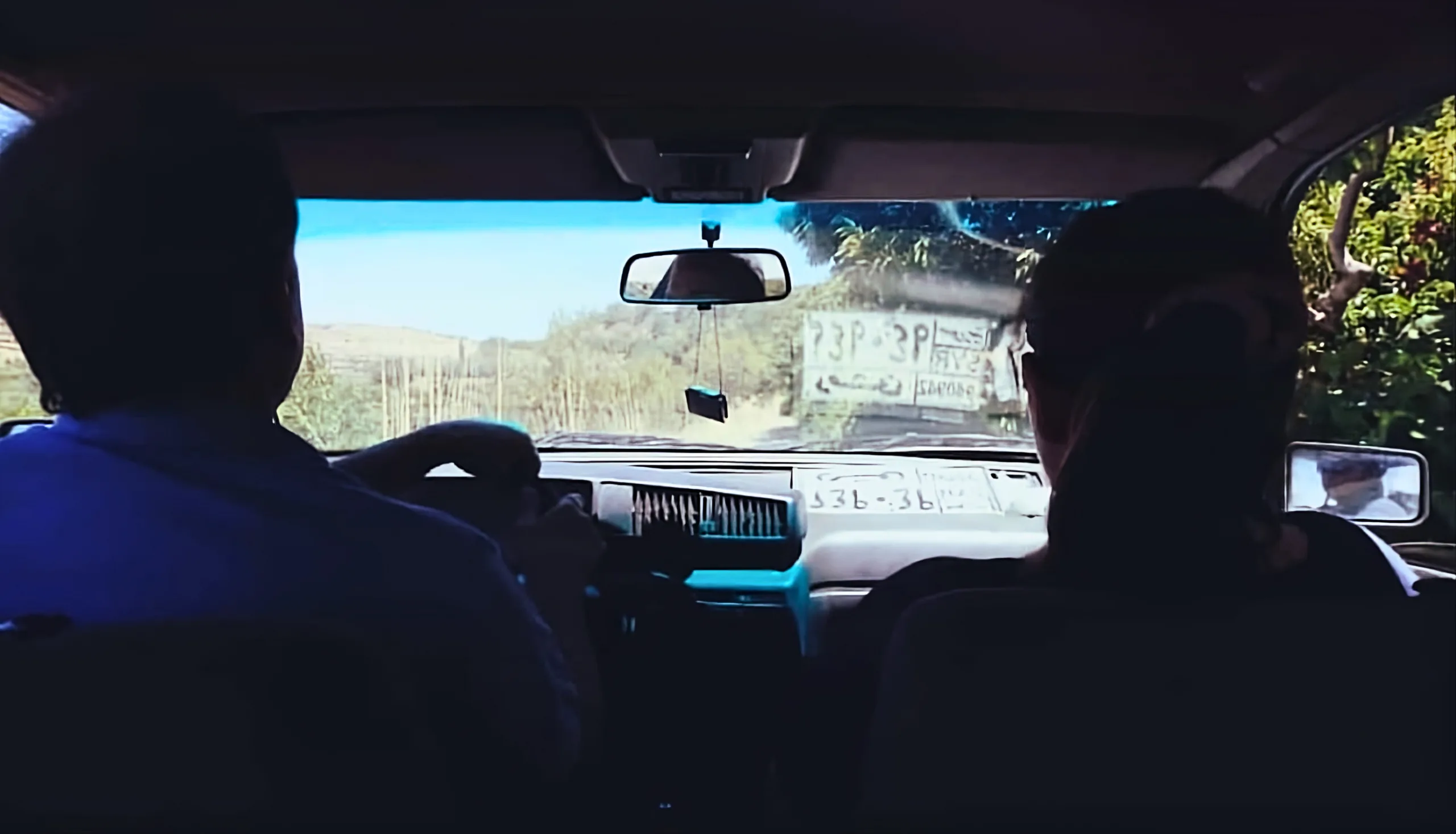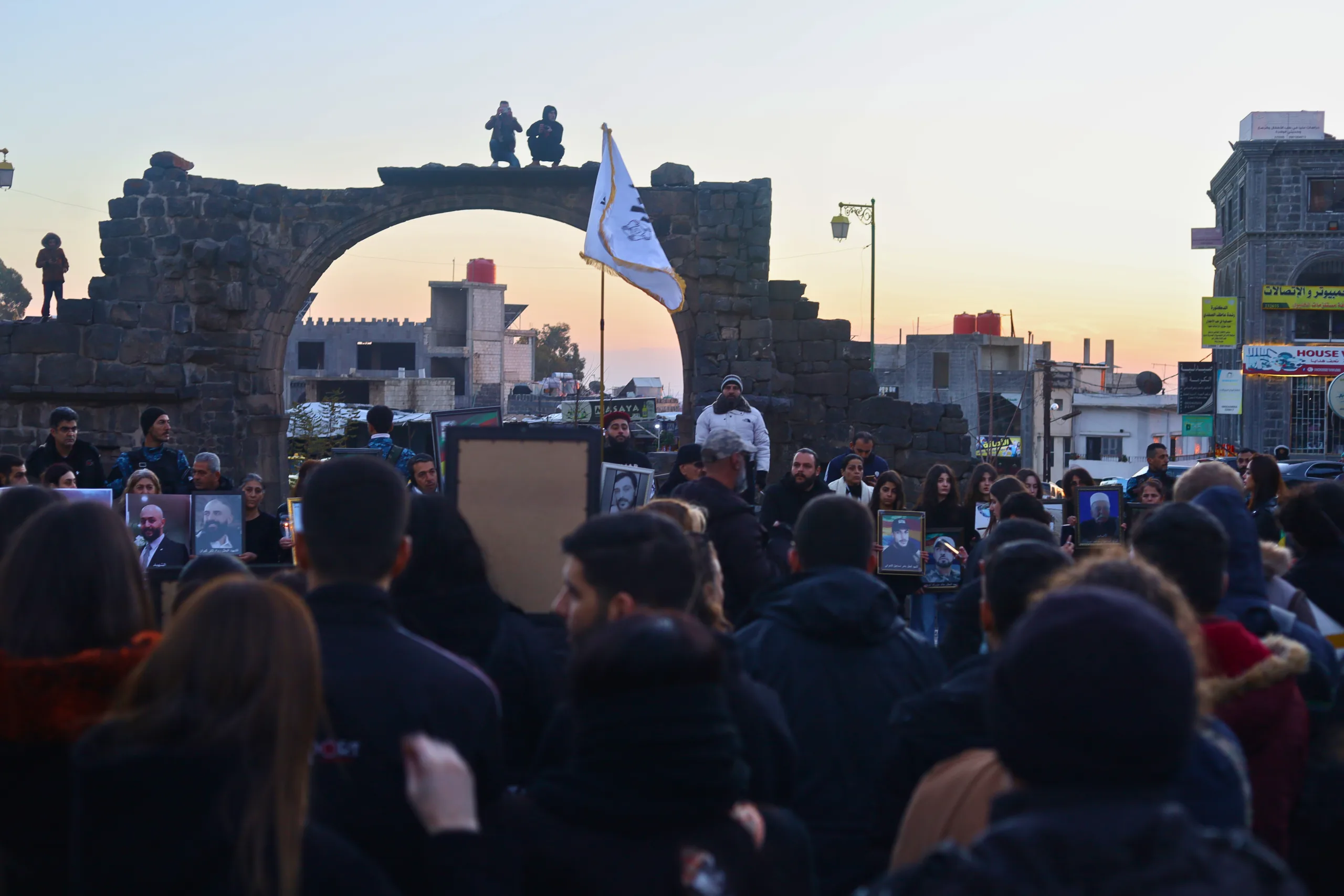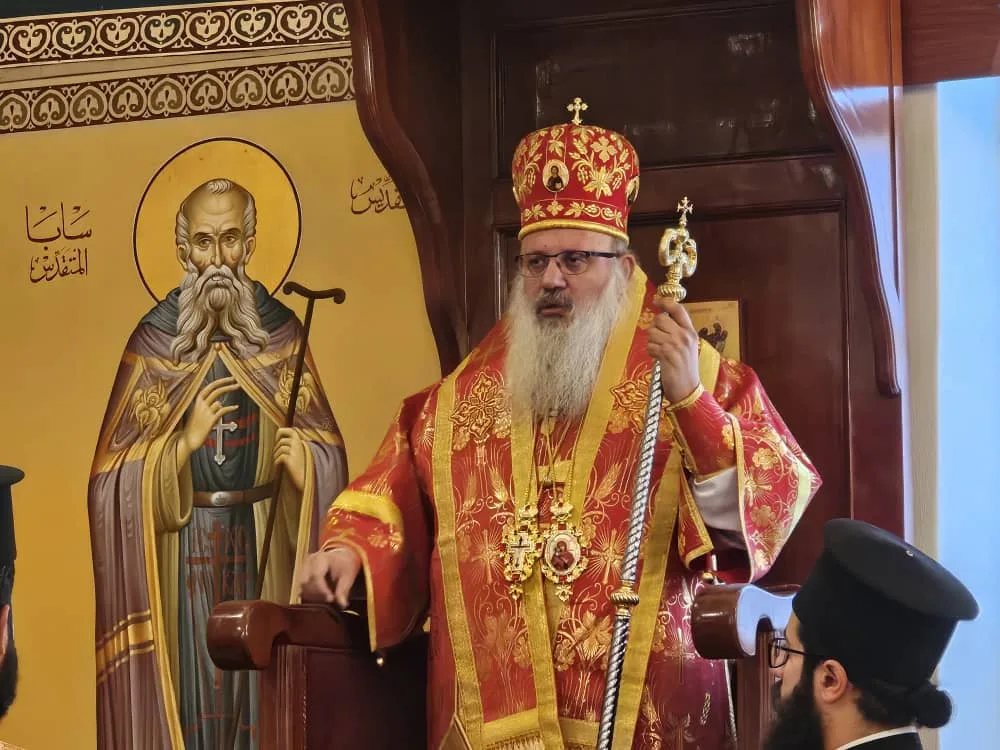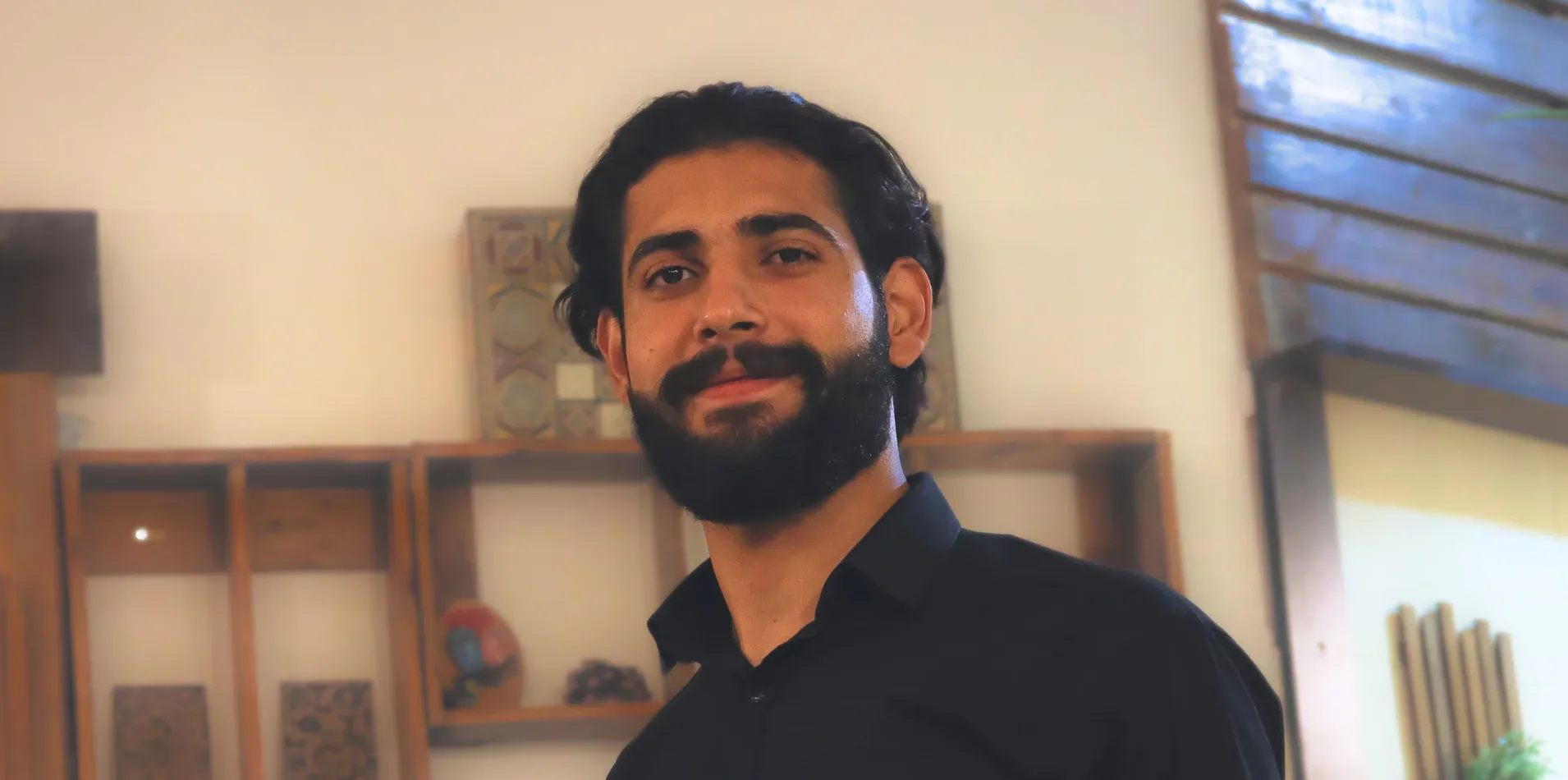My sister posted on Instagram a photo she took from the back seat of our car. In it you can see my mother and father from behind, and one of Jabal al-Sweida’s roads stretching out before them. She wrote on it: it will never be the same again. Life will never be the same.
The picture is pixelated and dim, yet we can make out a lot of detail: a small copy of the Qur’an hanging from the mirror, the car plate pried off in front of my mother that says “Damascus,” my mother’s chin in the side mirror, and my father’s brow in the rearview.
The photo broke my heart. I asked my sister to send it to me to keep, without the sentence she wrote.
Ironically, and purely by chance, my Syrian friend Yazan posted a photo with the same composition a few hours later. He is sitting in the back so we do not see him; we see only his father driving and his mother in the front seat. Unlike my sister’s story, he wrote: “I’m sitting in the middle, just like little Yazan used to,” then added the Syrian independence flag and the word hello with the location: Damascus, Syria. He was saying he had returned home.
In his photo we see his father’s head in the mirror and his mother’s left cheek.
This is not the first time a scene like this stops me. I know the back-seat view and I cherish it. I made a resolve to feel that moment every time I go back to Sweida. Just like Yazan, I feel like “little Sami” again. I remember videos I shot of my mother and father from that angle without their knowing. It is striking to want to photograph your loved ones even when their faces do not appear. My sister could have posted a photo of our parents facing the camera and smiling. She posted this one instead, not only out of love for them, but as an elegy for a life that now feels far away.
This photo is larger than us and larger than the war. It speaks of a childhood we shed with no return, and of adults trying in vain to catch up with it through small details. We become our parents. We make morning coffee the way they did, we put a series on the TV and leave only the sound. The back seat reminds me of ease, and maybe that is what I miss most from childhood: complete ease before we even knew to call it ease. To doze off in the car after an outing and wake in your bed in the morning. Someone carries you while you sleep on your father’s shoulder. I miss that feeling. That everything will be all right. That every mistake is forgiven, and that someone is shielding you from the world’s malice. As long as you are in the back seat, everything is fine.
A car is transportation, yes, but it is also a place of memory. It can be a moving weapon, but more often it is a shell that protects us. A second home where a whole life unfolds: trips to the countryside, the commute to work, the baby seat, errands, songs, little skirmishes.
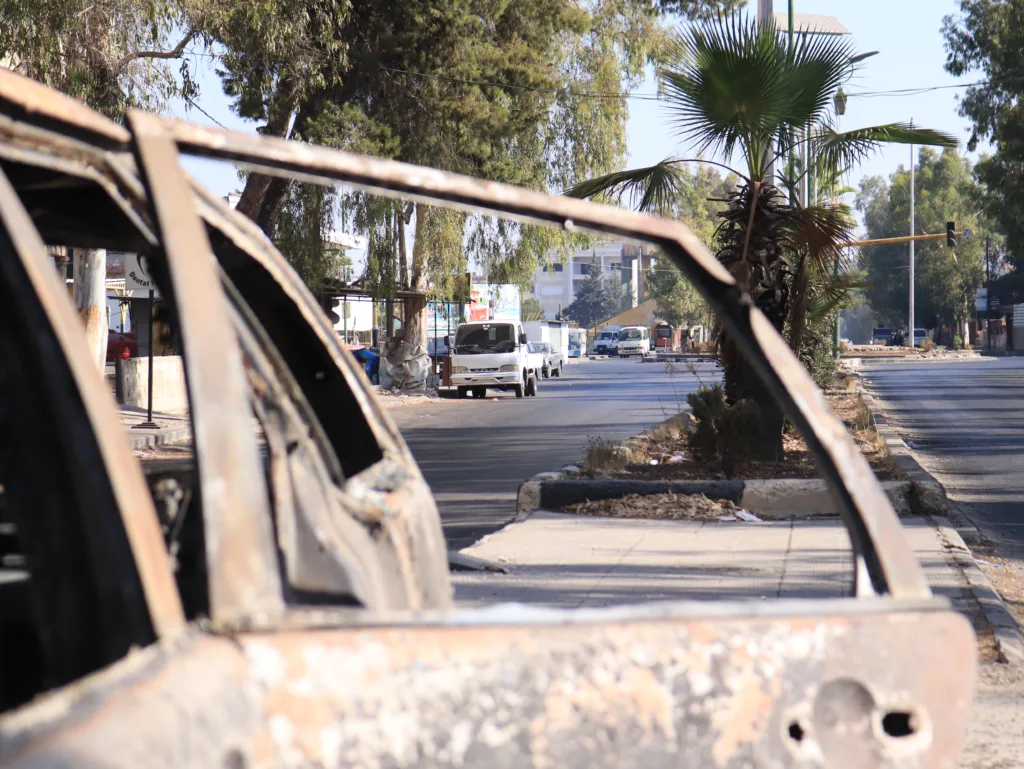
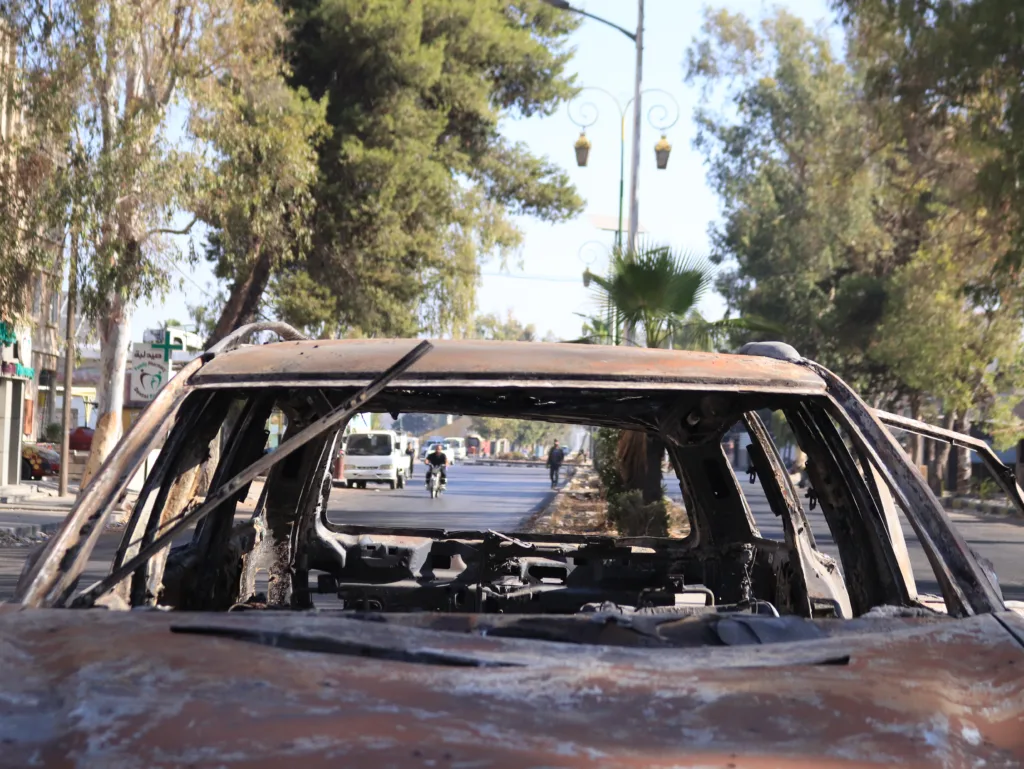
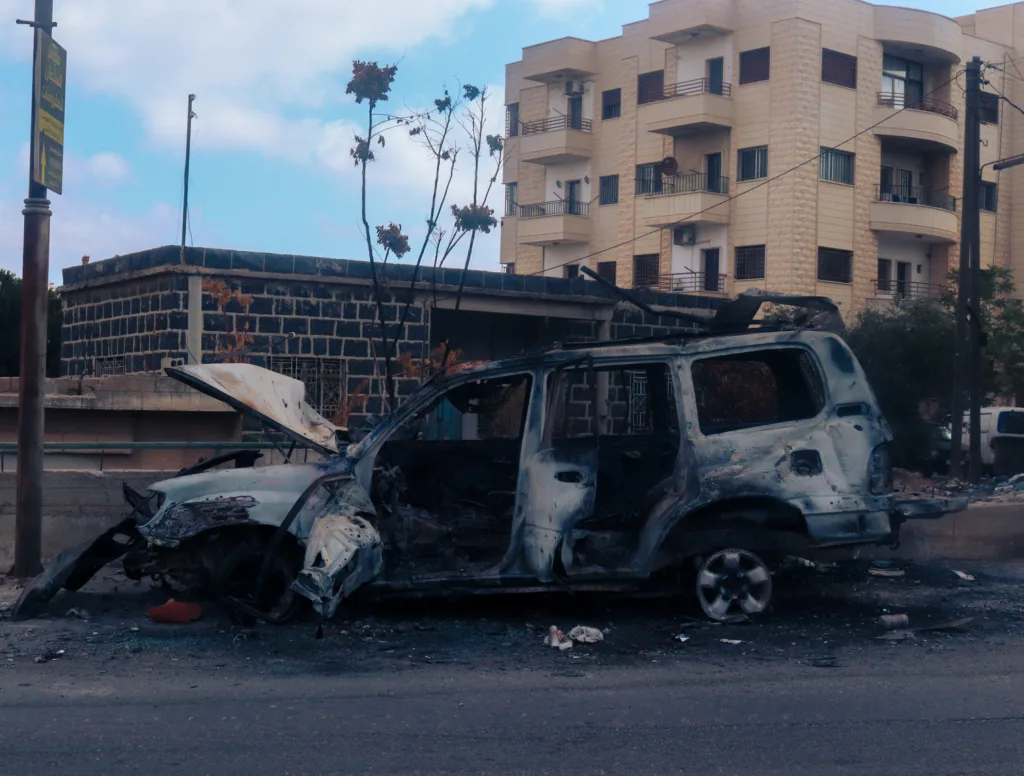
Whenever my mother starts reminiscing about the time before I was born, she says, “Back when we had the Subaru.” I grew up with the white Peugeot with the cloth seats. The smell of fresh bread would fill it after my father bought hot loaves and spread them across the back seat so they would not get damp in the bag. I knew the manual window crank, my first exercises in patience and effort as a child. I recognized the Peugeot in the photo my sister posted. The Peugeot was a cradle for our memories.
- “They’re good people, really kind.”
- “May they be blessed.”
This exchange echoes from their mouths after every visit. The car also witnessed their sparring, not their fights. They like the word “skirmish” because it sounds gentler. It held all their conversations and every Joseph Sakr and Ziad Rahbani song on a single CD that was always playing.
The past hurts me, and it scares me more than the future. The past does not return, and still we recall it and sometimes wait for it. Worse than time passing is losing its landmarks in our present: a house collapsed, a house burned. There are too many such houses in Sweida today.
The centered angle of the photo matches exactly the perspective of my memories in the car; I was always wedged in the middle between my two sisters. I did not demand a window seat. I gave in, sat in the middle, and stretched my legs to either side. When I grew taller, my mother insisted I sit in front next to my father. It weighed on my heart. I felt I was encroaching on a space that belonged to my mother, as if my fate were to stay in the back, seeing only the violet hair tie at the back of her head and the red rim of my father’s sunglasses. Moving to the front was a rite of passage, a sign of coming of age. You sit beside the driver when your mustache starts to show. I hated that. In our culture the front seat is for the person of higher standing, not only the older one. What does it mean for my mother to sit in back when she is the greatest person I know. What does it mean for me to sit in front when I am “little Sami.”
The last phase was the driver’s seat. My father’s attempts to teach me to drive never end. He would suddenly pull the car over and say, “Come on, switch.” I sit behind the wheel and feel everything except control. Maybe my real comfort is still in the back.
I write these lines on a plane to Beirut, where my mother and sister are waiting after managing to leave Sweida through the Bosra al-Sham crossing, the only current “humanitarian” crossing. In recent days civilian cars were targeted on the road, heavy gunfire at cars and buses left people injured, some dead, kidnappings, material damage. I saw the images. A car riddled with bullets.
A surveillance camera video spread showing a car being targeted, swerving, and crashing into a pole with a camera on it. They came close and took the children from the back seat. I curse a world where a child does not feel safe in the back seat with his mother and father. Their childhood was stolen, and I feel mine was taken with it.
My father bought my brother a Kia Rio that later became everyone’s car. Even so, we still consider the white Peugeot the family car. Everyone learned to drive on it, except me on the manual shift. The car sat parked for a long time, and my father insists on starting it now and then. He does not want to let it go.
The siege of Sweida continues. Food, medicine, and fuel are running out. My father and sister swapped the car for a bicycle that had been sitting at home. Perhaps that bicycle holds memories too. I hope everything will be all right. I hope Yazan has a gentle visit in Damascus.
At Dubai Airport, hurrying toward my gate, I heard “final call to Damascus.” I stopped where I was. It was the first time I heard “Syria” or “Damascus” in an airport after some routes resumed. I felt sad. Maybe I will not set foot in Syria soon, by my choice or not. Then I turned my head and walked toward my mother and sister.
My sister tells me she took the wheel when news broke that General Security forces had entered Sweida heading toward Salkhad in the east of the governorate. She sat in the driver’s seat, my mother beside her, my cousin’s daughter and her children in the back crying. She will never forget that scene. She kept checking the rearview to make sure everyone was okay. She looked to her right at my mother, who has diabetes, to make sure she was all right. The sky above them was black with smoke from clashes and shelling. The car acted out our roles: those in front reassure those in back, pass falafel to them, soothe the children, check if they have fallen asleep.
In today’s Syria there are cars on both sides, symbolically and literally. Cars leaving, and others returning to the illusion of homeland. Cars riddled with bullets, cars bearing slogans in support of the new government, cars with no plates, stolen cars, cars stained with blood. May we all feel safe someday, sitting in the back seat. I would like, just once more, to sit there, and for my mother to sit in front, reaching her hand back for me to hold it like we used to, and for my father to sing along with Joseph Sakr: “Get up, go to sleep, and dream that our country has finally become a country.”
